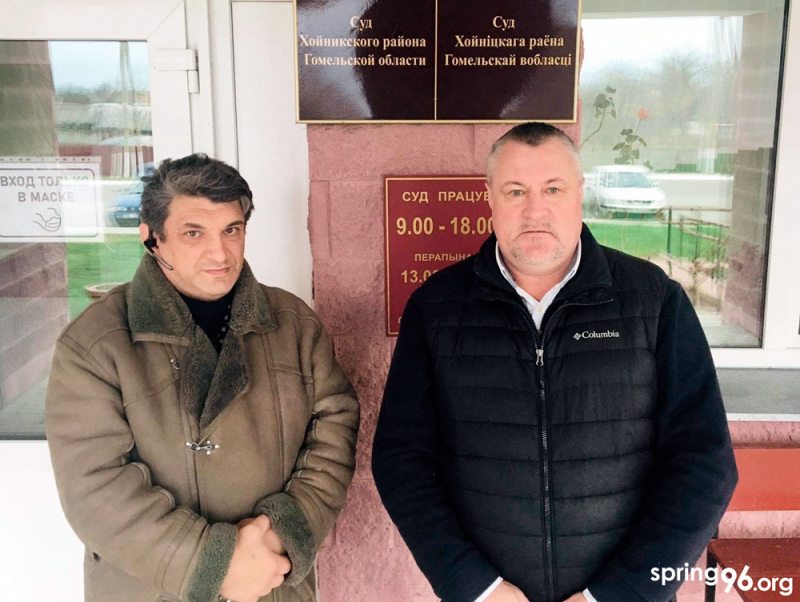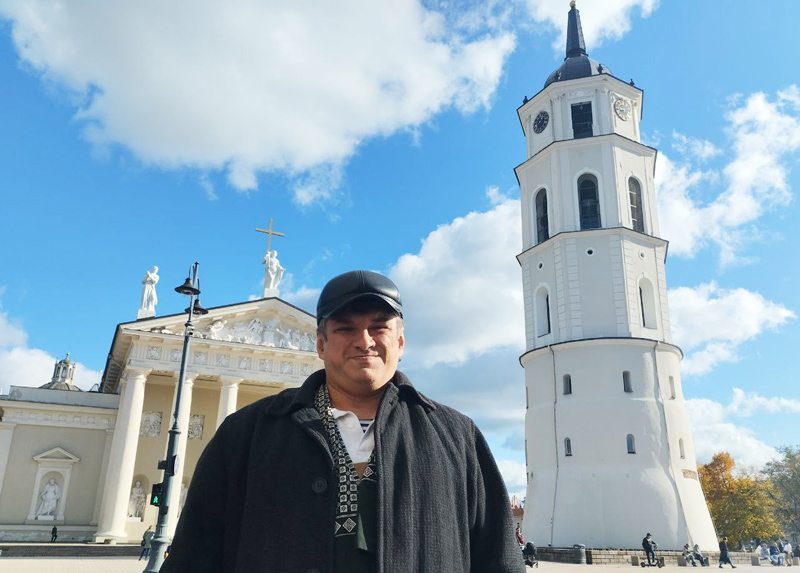"They began to threaten me with a new criminal case": Aliaksei Ramanau speaks about the persecution after the penal colony
The 2020 election campaign changed a lot in the life of Aliaksei Ramanau, an activist from the Homieĺ region: at one of Sviatlana Tsikhanouskaya's campaign rallies in Chojniki, he spoke negatively about Aliaksandr Lukashenka. It resulted in criminal prosecution. On December 16, 2020, the Chojniki District Court sentenced Aliaksei to one year in a general security penal colony under Article 368 of the Criminal Code (insulting Lukashenka). But even after serving his sentence, the authorities did not stop the persecution of the activist.
Aliaksei Ramanau served his sentence in full and was released from Prison No. 13 in Hlybokaje on November 23, 2021. The administration of the penal colony treated him like other political prisoners — penalties were imposed for every offense, and it was necessary to behave very carefully. In the Hlybokaje colony, Aliaksei was diagnosed with adenoma, he had seizures and bleeding. He needed to have an surgery, but he was told: "Be patient, be patient."

- Aliaksei Ramanau and Leanid Sudalenka on November 12, 2020.
After his release, Aliaksei could not officially get a job anywhere, so he worked part-time on construction sights and renovations.
"After my release, I had no job. No state institution wanted to take me, since I was a political prisoner. I once tried to get a job at a depot in Kalinkavičy, and even managed to work for a couple of weeks, but then they found out that I was a political prisoner, and I was fired. But you have to live, so I was always looking for some part-time jobs, and I helped people privately. Moreover, I have several specialties and can do a lot of things," says Aliaksei.

"I thought that after my release everything would calm down and no one would touch me anymore"
Two years later, the security forces became interested in Ramanau again. At that time, he moved to a village in the Kalinkavičy district, hoping that they would leave him alone here and no one would touch him anymore. But in early January 2023, Aliaksei was searched, without an explanation on what they wanted to find. Then the detentions began. On March 16, for subscriptions to "extremist" channels. After the detention, Aliaksei was taken to the hospital for a medical examination, which concluded that the man could serve administrative arrest. Before the trial, Aliaksei Ramanau was in the Kalinkavičy temporary detention facility, and the court sentenced the man to 2 days of arrest.
On January 23, 2024, Aliaksei was detained in Homieĺ. In the morning, law enforcement officers came to him and conducted a search. Then Aliaksei was taken for interrogation by the KGB. They asked about the participation of the former political prisoner in an "extremist formation." The court sentenced him to 15 days of arrest.
February 13, 2024 Aliaksei was detained again and sentenced under under Article 24.15 of the Administrative Code (violation of legislation on foreign gratuitous assistance) to 30 days of arrest. He served administrative arrest in the Homieĺ temporary detention facility together with activist Vasil Paliakou.
"At 6 a.m., a district police officer arrived in the village and they took me right from my home. They took me to the Kalinkavičy district police department, where they questioned me about the care packages and the amount of food I bought. They had a whole list of things bought in a Euroopt store, and I was fined 800 rubles for it (more than 200 euros). Then they summoned me to Minsk, to the Investigative Committee, and questioned about food parcels, threatened that they would initiate a case for connections with extremists. I really felt that they wanted to initiate another criminal case," says the former political prisoner.
"But what about the Hippocratic Oath? You took it, didn't you?"
Aliaksei had a disability, and after his release from the penal colony the authorities annulled this status. However, diseases remained, including oncology and pancreatitis:
"In January 2024, when I was in the temporary detention facility, I was taken to the hospital in Homieĺ three times to stop the seizures. They gave me food which I couldn't eat, because they had previously removed most of my pancreas and part of my stomach and spleen. And the doctors at the same time said: 'When you're released, get a surgery. We will not perform it now.' 'But what about the Hippocratic Oath? You took it, didn't you?' I said. It was only after 30 days of administrative arrest that I was able to have a surgery to remove fibroids.
In order not to tempt fate anymore, Aliaksei Ramanau decided to go abroad.
"Now I feel a little stressed from the changes and my new surroundings. I need to get follow-up care after the surgery, but I don't know what to prioritize right now: I need to socialize and process the documents for legalization. I am now writing to diaspora groups so that they can help me find some work, because this is more important to me at the moment. I'm ready to work, so write that I need any job now.

One more defamation sentence: Man with cancer gets one year in prison for “insulting” Lukashenka


















